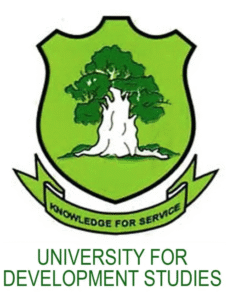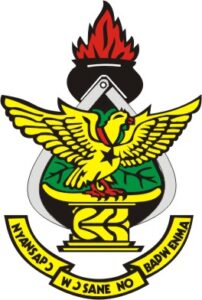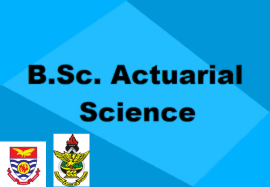
University of Cape Coast (UCC), Bachelor of Science (B.Sc) in Agribusiness
Department: Department of Agricultural Economics and Extension
Mode of Study: Regular
About the Programme
Our B.Sc. in Agribusiness equips graduates with the skills to explore diverse career opportunities in both the public and private sectors. Graduates gain an in-depth understanding of this multidisciplinary industry, making them valuable assets to agro-based organisations.
Career Opportunities for Graduates
- Product Support Specialists
- Agricultural Finance Advisors
- Project Officers in local & multinational organisations (e.g., Food and Agriculture Organisation – FAO)
- Project Officers in Banks
- Management Information System (MIS) Officers in the agricultural and non-agricultural sectors
- Entrepreneurs (Establishing and managing commercial farms)
Entry Requirements
- SSSCE/WASSCE Applicants
Candidates must have passed the following core subjects:
- English Language
- Mathematics
- Integrated Science or Social Studies
PLUS passes in three (3) elective subjects from any of the options below:
OPTION 1: Science Students
- Chemistry
- Physics or Mathematics
- Biology or General Agriculture
OPTION 2: Business Students
- Economics
- Accounting
- Business Management & Costing or Elective Mathematics
*(Must have at least **Grade D (SSSCE) or C6 (WASSCE) in Integrated Science*)*
OPTION 3: Arts Students
- Economics
- Elective Mathematics
- Geography or French
*(Must have at least **Grade D (SSSCE) or C6 (WASSCE) in Integrated Science*)*
OPTION 4: Agricultural Students
- General Agriculture or Biology
- Crop Husbandry & Horticulture, Animal Husbandry, Fisheries, or Forestry
- Chemistry, Physics, or Mathematics
- Diploma Holders
- Diploma in any Agriculture-related field from a recognised institution (Minimum: Second Class Lower)
- Admission into Level 300 (Candidates must pass a selection interview)
Program Structure – (B.Sc) in Agribusiness
Level 100 (First Year)
First Semester
- ABU 103N – Principles of Microeconomics
- ABU 104N – Principles of Macroeconomics
- ABU 106N – Gender and Leadership Issues in Agribusiness
- ABU 108N – Introduction to Agribusiness
- ABU 110N – Introduction to Mathematical Economics
- ABU 111N – Principles of Marketing
- ABU 113N – Principles of Management
- AGN 101 – Introduction to Agriculture
- CMS 107 – Communicative Skills I
- ILT 101 – Information Literacy
Second Semester
- ABU 109N – Introduction to Food Systems
- ABU 112N – Business of Soil Management
- ABU 114N – ICT for Agribusiness Management
- ASP 103B – African Studies
- CMS 108 – Communicative Skills II
Level 200 (Second Year)
First Semester
- ABU 201N – Elements of Microeconomics
- ABU 207N – Organizational Behaviour
- ABU 214N – Sociology and Change Management
- ABU 215N – Investment Strategy, Entrepreneurial Failure and Exit
- ABU 219N – Technology and Innovation
- ABU 308N – Agricultural Produce Processing
- ACR 201B – Horticulture Business Management
Second Semester
- ABU 208N – Elements of Macroeconomics
- ABU 209N – Project Planning and Management
- ABU 210N – Agricultural Development
- ABU 216N – Creative Thinking and Entrepreneurship Process
- ABU 217N – Introduction to Ideation and Artificial Intelligence
- ABU 218N – Sustainable Environmental and Resource Management
- ABU 220N – Crop Production and Management Systems
- ABU 221N – Animal Production and Management Systems
- AEN 201B – Post-Harvest and Agro-Waste Management
Level 300 (Third Year)
First Semester
- ABU 301N – Business Law
- ABU 306N – Human Resource Management
- ABU 309N – Business Communication and Customer Relations
- ABU 310N – Agribusiness Strategic Seminar
- ABU 311N – Marketing Research Techniques
- ABU 316N – Research Methods for Agribusiness
- ABU 317N – Business Statistics and Quantitative Methods
- ABU 318N – Entrepreneurship
- AEN 201B – Post-Harvest and Agro-Waste Management
Second Semester
- ABU 305N – Agricultural Price Analysis
- ABU 312N – Fisheries and Aquaculture Business Management
- ABU 313N – Principles of Cost and Management Accounting
- ABU 314N – Econometrics
- ABU 319N – Food Law, Safety and Quality Standards
- ABU 320N – Agribusiness Managerial Economics
- ABU 321N – Value Chains and Vertical Coordination in Agri-Food Systems
Level 400 (Final Year)
First Semester
- ABU 402N – Six-Month Supervised Agribusiness Projects (SAPs)
- ABU 403N – Agricultural Trade and Policy in Developing Countries
- ABU 406N – Agribusiness Finance
- ABU 411N – Pre-SAPs: Business Plan Development and Pitching
- ABU 415N – Taxation and Auditing Practices in Agribusiness
Second Semester
- ABU 412N – International Food and Agricultural Marketing
- ABU 413N – Agribusiness Risk Management
- ABU 414N – Agribusiness Strategic Management
- ABU 499N – SAPs Report
Follow us on WhatsApp for more updates: https://whatsapp.com/channel/0029VaCyYGIFHWpx22L38a2K
Seekers Consult
Contact Us for Your Study Abroad Journey
We search for schools and check available scholarships for you
Contact: 0550414552 / 0362297079

Loan for government workers
Transcript Application
English Proficiency
Recommendation letter
Project work/thesis for undergraduate, master’s, and PhD students.
Apply for Affidavit, Gazette instantly
Passport and Visa Applications
All other Internet Services
University of Ghana (Legon), Bachelor of Science (B.Sc) in Agribusiness
Academic Programmes
Diploma in Agriculture
This is a three-semester sandwich intensive programme which is conducted during the long vacation (June to August)
BSc. (Agriculture) Degree
The School of Agriculture offers a four-year undergraduate course leading to the BSc. (Honours) Degree in Agriculture with specialisation in Agricultural Economics, Agribusiness, Animal Science, Crop Science, Post-Harvest Technology, Biotechnology, and Soil Science.
BSc. /B.A (Family and Consumer Science)
The School of Agriculture offers a four-year undergraduate course leading to the BSc. /B.A (Honours) Degree with specialisation in Food & Clothing and Family and Child Studies.
Postgraduate Programmes
Graduate Courses leading to MPhil or PhD degrees are available in all departments. Additionally, the Department of Agricultural Economics runs MAA and MPhil courses in Agricultural Administration.
Entry Requirements
Diplomas
Senior Secondary School Certificate (SSSCE) or West African Senior Secondary School Certificate (WASSCE)
- A)Credit in Core English, Core Mathematics, Integrated Science, and Social Studies, and
- B)Passes in at least one of Chemistry, Physics, and Elective Mathematics
Applicants who have a pass in only one of the three subjects (in B) should, in addition, have a pass in the following subjects;
Biology, General Agriculture, Crop Husbandry and Horticulture, Forestry, Animal Husbandry, Economics, Geography, and Fisheries
Post-Secondary Teacher Training College Certificate “A” or Agricultural College Certificate
Applicants who do not meet the above requirements may write an entrance examination to be conducted by the School of Agriculture.
Bachelor’s Degree
- A)West Africa Secondary School Certificate: Credit in three core subjects, namely English, Mathematics, and Integrated Science, and
- B)Three Elective Subjects from Chemistry, Physics, Elective Mathematics, General Agriculture, Biology, Geography, Economics in the Senior Secondary School Certificate Examinations (SSSCE) or West African Senior Secondary School Certificate Examination (WASSCE).
Diploma to Degree
Holders of the School of Agriculture Diploma Certificate with a Final Grade Point Average (FGPA) of 3.00 or better are eligible to apply for the BSc Agriculture Programme for admission. All Diploma holders will be admitted to Level 200.
Higher Degrees
An applicant must hold a good first degree in the related field for the MPhil and MAA degrees. Applicants for PhD degrees must have obtained an MPhil with research in the relevant field as stipulated in the University of Ghana Handbook for graduate applicants.
University of Development Studies (UDS), Bachelor of Science (B.Sc) in Agribusiness
About The Programme
The B.Sc. agribusiness programme is designed to equip students with a solid foundation in basic science, which is crucial for understanding agricultural principles. The curriculum further integrates this scientific knowledge with elements of extension, economics, business, and management. The goal is to give students a holistic understanding of the agricultural sector from a business perspective.
Entry Requirements
BSc. Agribusiness (Agricultural & Resource Economics, Agribusiness Management & Finance, Agricultural Administration). This programme is for both science-based and non-science-based SSCE/WASSCE holders with three (3) credit passes in core subjects and three (3) credit passes in elective subjects.
About The Programme
The MPhil Agribusiness programme is a hands-on course that combines intensive coursework with a research component. It aims to equip graduates with a unique mix of theoretical concepts, practical training, and research skills to manage agri-food industries. The program is designed to align students’ technical knowledge with national policies in the agricultural industry.
The specific objectives of the MPhil Agribusiness are as follows:
- Train students capable of supporting the growth and development of the Agribusiness sector
- Equip students with the research capacity and analytical competencies required to understand and address constraints in the agribusiness sector.
- Equip students with the skills and tools required to understand and facilitate policy discourse, policy formulation and implementation.
- Train students to gain monitoring and evaluative research skills in the agricultural and food industry.
Prospects for Graduates of MSc/MPhil programmes
Graduates of the MSc/MPhil programmes will be particularly useful in the following public, industry and academic fields:
Public Sector
- Teach in various tertiary training institutions such as Universities, Colleges of Education and Colleges of Agriculture
- Work as researchers in local and international institutions such as CSIR (Savannah Agricultural Research Institute, Cocoa Research Institute, Crop Research Institute, Science and Technology Policy Research Institute) etc., National Development Planning Commission, Ministry of Food and Agriculture (MoFA), Ghana Statistical Service, (IFPRI, etc.
Private sector
- Local and International financial institutions such as the Agricultural Development Bank, Ghana Commercial Bank, the World Bank, the African Development and the International Finance Corporation, micro-finance institutions, investment and asset management institutions, etc.
- Agro-based industries such as manufacturing and processing companies (Unilever, Cocoa processing company, Olam, AVNASH, etc), production (e.g. Commercial poultry farms, high-value horticultural export production value chain, etc)
- Local and international NGOs with agriculturally oriented projects such as the Food and Agriculture Organisation (FAO), the International Food Policy Research Institute (IFPRI), USAID ADVANCE, USAID FINGap, ACDI VOCA, etc.
Entry Requirements
TO BE ADMITTED INTO A PROGRAMME LEADING TO THE AWARD OF A GRADUATE DIPLOMA OR THE MASTER’S DEGREE (MSc. AND MPhil), A CANDIDATE MUST:
- Have obtained a good first degree (at least Second Class Lower) in an appropriate field of study from a recognised University. Applicants with a first degree below Second-class Lower division may be admitted upon the recommendation of the Department. Applicants with a master’s non-research may be admitted to a 12-month top-up programme in the same or related field, leading to the award of an MPhil.
- Submit an official transcript of your academic record.
- Submit two referee reports from somebody familiar with the applicant’s academic work.
- In addition, those seeking a research-related degree must attach a 3- 5 -page research proposal of their intended area of research.
- Satisfy any additional requirements prescribed by the Faculties/Schools. These may include relevant work experience, a written entrance examination and an interview.
- Applicants must note that all MSc non-research programmes are available through the Sandwich
About The Programme
The ultimate objective of the MSc Agribusiness (sandwich) programme is to train agribusiness professionals who understand and are capable of supporting the agribusiness sector’s growth and development. In this regard, the curriculum for the MSc in Agribusiness (sandwich) program has been designed to achieve a balance of academic knowledge and practical skill development, resulting in competent agribusiness professionals with the ability to establish and manage agribusinesses. It would prepare students to acquire technical knowledge in accordance with national policies in the agricultural and food industries.
The programme seeks to achieve the following objectives:
- Equip students with the knowledge and skills required to manage agri-food enterprises and supply chain management
- Equip students with practical knowledge and problem-solving skills required to make them successful managers in the agribusiness sector.
- Give opportunities for students to develop a critical understanding of the current policy debate on economic transformation through agribusiness sector development.
- Assist students to identify and analyse different theoretical models of international trade in light of ‘real world’ situations, as well as assess the impact of regional integration and multilateral arrangements in agricultural commodity marketing.
- Train students to understand research methodology techniques in rural agribusiness and agripreneurial development in both domestic and international arenas.
Follow us on WhatsApp for more updates: https://whatsapp.com/channel/0029VaCyYGIFHWpx22L38a2K
Seekers Consult
Contact Us for Your Study Abroad Journey
We search for schools and check available scholarships for you
Contact: 0550414552 / 0362297079

Loan for government workers
Transcript Application
English Proficiency
Recommendation letter
Project work/thesis for undergraduate, master’s, and PhD students.
Apply for Affidavit, Gazette instantly
Passport and Visa Applications
All other Internet Services
Entry Requirements
TO BE ADMITTED INTO A PROGRAMME LEADING TO THE AWARD OF A GRADUATE DIPLOMA OR THE MASTER’S DEGREE (MSc. AND MPhil), A CANDIDATE MUST:
- Have obtained a good first degree (at least Second-Class Lower) in an appropriate field of study from a recognised University. Applicants with a first degree below Second-class Lower division may be admitted upon the recommendation of the Department. Applicants with a master’s non-research may be admitted to a 12-month top-up programme in the same or related field, leading to the award of an MPhil.
- Submit an official transcript of your academic record.
- Submit two referee reports from somebody familiar with the applicant’s academic work.
- In addition, those seeking a research-related degree must attach a 3- 5 -page research proposal of their intended area of research.
- Satisfy any additional requirements prescribed by the Faculties/Schools. These may include relevant work experience, a written entrance examination and an interview.
- Applicants must note that all MSc non-research programmes are available through Sandwich.
About The Programme
The main objective of the PhD Agribusiness programme is to deepen the research capacity and analytical competencies of agribusiness professionals in the agribusiness sector.
Specifically, the PhD Agribusiness programme seeks to achieve the following objectives:
- Emphasise independent, high-quality, and specialised research to enable agribusiness experts to contribute in-depth to the growth and development of the agribusiness sector.
- Equip students with the skills and tools required to understand and facilitate policy formulation and implementation.
- Contribute to industry knowledge by facilitating quality research in agribusiness and related sectors.
Prospects for Graduates of PhD Agribusiness
Graduates of the programmes will be particularly useful in the under-listed public, industry and academic fields:
Public Sector
- Teach in various tertiary training institutions such as Universities, Colleges of Education and Colleges of Agriculture
- Work as researchers in local and international institutions such as CSIR (Savannah Agricultural Research Institute, Cocoa Research Institute, Crop Research Institute, Science and Technology Policy Research Institute) etc., National Development Planning Commission, Ministry of Food and Agriculture (MoFA), Ghana Statistical Service, IFPRI, etc.
Private sector
- Local and International financial institutions such as the Agricultural Development Bank, Ghana Commercial Bank, the World Bank, the African Development and the International Finance Corporation, micro-finance institutions, investment and asset management institutions, etc
- Agro-based industries such as manufacturing and processing companies (Unilever, Cocoa processing company, Olam, AVNASH, etc), production (e.g. Commercial poultry farms, high value horticultural export production value chain, etc)
- Local and international NGOs with agriculturally oriented projects such as the Food and Agriculture Organisation (FAO), the International Food Policy Research Institute (IFPRI), USAID ADVANCE, USAID FINGap, ACDI
Entry Requirements
A CANDIDATE SEEKING ADMISSION INTO THE PHD. PROGRAM MUST:
- Have an M.Phil./M.Sc. by research degree in an appropriate field of study from a recognised University.
- Submit an official transcript of your academic record.
- Submit two referee reports from somebody familiar with the applicant’s academic work.
- Submit a proposal of 3-5 pages of the intended study area, including a working bibliography.
- Satisfy any additional requirements prescribed by the Department/Faculty.
- Intake levels shall be influenced by the availability of supervisors for the student’s interest areas and fields of study.
- Faculties, schools, and departments are responsible for setting admission standards in conformity with the overall university standards.
Follow us on WhatsApp for more updates: https://whatsapp.com/channel/0029VaCyYGIFHWpx22L38a2K
Seekers Consult
Contact Us for Your Study Abroad Journey
We search for schools and check available scholarships for you
Contact: 0550414552 / 0362297079

Loan for government workers
Transcript Application
English Proficiency
Recommendation letter
Project work/thesis for undergraduate, master’s, and PhD students.
Apply for Affidavit, Gazette instantly
Passport and Visa Applications
All other Internet Services
Kwame Nkrumah University of Science and Technology (KNUST),Bachelor of Science (B.Sc) in Agribusiness
BSc Agriculture (Economics Option)
Undergraduate Courses under BSc Agriculture (Economics Option and Extension Option):
|
Level |
FIRST SEMESTER |
SECOND SEMESTER |
|
Year 1* |
AGEC 151: Principles of Extension |
AGEC 152: Economics for Agriculture &Natural Resources |
|
AGEC 154: Statistics for Agriculture & Natural Resources |
||
|
Year 2* |
AGEC 251: Agricultural Economics |
AGEC 252: Farm Records Mgt. and Accounting |
|
AGEC 254: Rural Sociology |
||
|
Year 3* |
AGEC 351: Extension Comm. &Teaching Methods |
AGEC 352: Farm Management |
|
AGEC 353: Management Information System |
AGEC 356: Social Research Methods |
|
|
AGEC 355: Principles of Marketing |
||
|
Year 4 |
Economics Option |
|
|
AGEC 451: Agricultural Policy |
AGEC 452: Agricultural Marketing |
|
|
AGEC 453: Agricultural Finance |
AGEC 454: Introduction to Macroeconomics |
|
|
AGEC 455: Statistics for Research |
AGEC 456: Production Function Analysis |
|
|
AGEC 457: Production Economics |
AGEC 458: Agricultural Project Appraisal |
|
|
AGEC 459: Quantitative Methods |
AGEC 460: Accounting |
|
|
Extension Option |
||
|
AGEC 461: Agricultural Cooperatives |
AGEC 462: Social Change and Rural Development |
|
|
AGEC 463: Statistics for Social Research |
AGEC 464: Extension Training and Material Development |
|
|
AGEC 465: Participatory Technology Development |
AGEC 466: NGOs, Gender and Development |
|
|
AGEC 467: Extension Mgt.& Supervision |
AGEC 468: Group Dynamics |
|
|
AGEC 469: Programme Planning and Evaluation |
|
|
|
Both Economics and Extension Options |
||
|
AGEC 491: Seminar I |
AGEC 470: Management and Entrepreneurial Skills |
|
|
AGEC 493: Student Project II |
AGEC 492: Seminar I |
|
|
|
AGEC 494: Student Project II |
|
BSc Agriculture (Extension Option)
Undergraduate Courses under BSc Agriculture (Economics Option and Extension Option):
|
Level |
FIRST SEMESTER |
SECOND SEMESTER |
|
Year 1* |
AGEC 151: Principles of Extension |
AGEC 152: Economics for Agriculture &Natural Resources |
|
AGEC 154: Statistics for Agriculture & Natural Resources |
||
|
Year 2* |
AGEC 251: Agricultural Economics |
AGEC 252: Farm Records Mgt. and Accounting |
|
AGEC 254: Rural Sociology |
||
|
Year 3* |
AGEC 351: Extension Comm. &Teaching Methods |
AGEC 352: Farm Management |
|
AGEC 353: Management Information System |
AGEC 356: Social Research Methods |
|
|
AGEC 355: Principles of Marketing |
||
|
Year 4 |
Economics Option |
|
|
AGEC 451: Agricultural Policy |
AGEC 452: Agricultural Marketing |
|
|
AGEC 453: Agricultural Finance |
AGEC 454: Introduction to Macroeconomics |
|
|
AGEC 455: Statistics for Research |
AGEC 456: Production Function Analysis |
|
|
AGEC 457: Production Economics |
AGEC 458: Agricultural Project Appraisal |
|
|
AGEC 459: Quantitative Methods |
AGEC 460: Accounting |
|
|
Extension Option |
||
|
AGEC 461: Agricultural Cooperatives |
AGEC 462: Social Change and Rural Development |
|
|
AGEC 463: Statistics for Social Research |
AGEC 464: Extension Training and Material Development |
|
|
AGEC 465: Participatory Technology Development |
AGEC 466: NGOs, Gender and Development |
|
|
AGEC 467: Extension Mgt.& Supervision |
AGEC 468: Group Dynamics |
|
|
AGEC 469: Programme Planning and Evaluation |
|
|
|
Both Economics and Extension Options |
||
|
AGEC 491: Seminar I |
AGEC 470: Management and Entrepreneurial Skills |
|
|
AGEC 493: Student Project II |
AGEC 492: Seminar I |
|
|
|
AGEC 494: Student Project II |
|
BSc Agribusiness Management
Undergraduate Courses under BSc Agribusiness Management:
|
Level |
FIRST SEMESTER |
SECOND SEMESTER |
|
Year 1 |
ABM 151: Introduction to Agriculture |
ABM 152: Foundation Agriculture |
|
ABM 153: Farm Records Mgt. & Accounting |
ABM 154: Agribusiness Finance |
|
|
ABM 155: Agribusiness Law |
ABM 156: Business Comm. and Customer Relations |
|
|
ABM 157: Principles of Agribusiness Management |
ABM 158: Agribusiness Accounting, Auditing & Taxation |
|
|
CS 157: Arable Crop Production and Management |
AGEC 152: Economics for Agriculture &Natural Resources |
|
|
AE 157 Farm Power and Machinery Management |
AGEC 154: Statistics for Agriculture& Natural Resources |
|
|
ENGL 157: Communication Skills I |
ABM 160: Apiculture |
|
|
MATH 157: Algebra |
ENGL 158: Communication Skills II |
|
|
Year 2 |
ABM 251: Agribusiness Planning and Analysis |
ABM 252: Agribusiness Risk and Resource Management |
|
ABM 253: Introduction to Macroeconomics |
ABM 254: Principles of Marketing |
|
|
AGEC 253: Computer Applications in Agriculture |
ABM 256: Cost and Accounting Management |
|
|
AE 291 Irrigation Systems Management |
AGEC 254: Rural Sociology |
|
|
CS 257: Crop Protection |
AS 254 Poultry Production and Management |
|
|
CS 259: Sustainable Land Management |
AS 256 Micro Livestock Production |
|
|
HORT 255: Seed Science and Technology |
CS 352: Plantation and Industrial Crop Production Mgt. |
|
|
ENGL 263: Literature in English I |
HORT 254: Ornamental Nurseries and Nursery Mgt. |
|
|
LAW 265: Land Law I |
ENGL 264: Literature in English II |
|
|
Year 3* |
ABM 351: Agric. Trade & Policy in Dev. Country |
ABM 352: Financial Analysis |
|
ABM 353: Marketing in Agribusiness |
ABM 354: Agricultural Produce Export Management |
|
|
ABM 355: Research Methods for Agribusiness |
ABM 356: Supply Chain Management |
|
|
AGEC 351: Extension Comm. & Teaching Methods |
ABM 358: Management Information System |
|
|
AE 260: Processing & Preservation of Agric. Produce |
ABM 360: Quantitative Methods for Agribusiness Mgt. |
|
|
AS 351 Cattle, Sheep and Goat Production |
ABM 364: Agricultural Cooperatives |
|
|
FSA 353: Principles and Practices of Aquaculture |
AS 352: Swine Production |
|
|
HORT 351: Fruit Crop Production and Management |
HORT 352: Vegetable Crop Production |
|
|
Year 4 |
ABM 451: International Agribusiness |
ABM 452: Production/Operations Management |
|
ABM 453: Marketing Management |
ABM 454: Strategic Agribusiness Management |
|
|
ABM 455: Vertical Coordination in Agri-Food System |
ABM 456: Entrepreneurship |
|
|
ABM 457: Food Safety and Quality Standards |
ABM 458: Project Appraisal and Management |
|
|
AS 455 Meat Science & Animal Products Processing |
ABM 460: Financial Management |
|
|
HORT 451: Landscape Design and Construction |
ABM 462: Human Resource Management |
|
|
ABM 491: Seminar I |
ABM 492: Seminar II |
|
|
ABM 493: Student Project I |
ABM 494: Student Project II |
MPhil/PhD Agricultural Economics
MPhil Agricultural Economics
|
Level |
FIRST SEMESTER |
SECOND SEMESTER |
|
Year 1
|
AGEC 551: Research Methodology |
AGEC 552: Project Appraisal |
|
AGEC 553: Stats. Theory, Analysis & Computing |
AGEC 554: Agricultural Policy Analysis |
|
|
AGEC 555: Mathematics for Economists |
AGEC 556: Applied Econometrics |
|
|
ECONS 551: Microeconomics Theory |
AGEC 558: Production Economics |
|
|
ECONS 553: Macroeconomics Theory |
AGEC 570: Resource Economics |
|
|
AGEC 564: Agricultural Finance* |
||
|
AGEC 586: International Agricultural Marketing* |
||
|
Year 2 |
AGEC 691: Seminar I |
AGEC 692: Seminar II |
|
AGEC 693: Thesis |
AGEC 694: Thesis |
MSc/MPhil/PhD Agribusiness Management
MPhil Agribusiness Management (REGULAR & IDL-MSc)
|
Level |
FIRST SEMESTER |
SECOND SEMESTER |
|
Year 1 |
ABM 551: Agribus. Mgt. and Value Chain Analysis |
ABM 552: Qualitative & Quantitative Methods for Agribusiness |
|
ABM 553: Business Economics |
ABM 554: Marketing and Agric. Trade Policies |
|
|
ABM 555: Research Methodology |
ABM 556: Agribusiness Law and Ethics |
|
|
ABM 557: Agribusiness Project Planning and Mgt. |
ABM 558: Agribusiness Finance and Business Risk Mgt. |
|
|
ABM 559: Financial and Managerial Accounting |
ABM 592: Seminar |
|
|
Elective (Select One) |
Elective course (Select One) |
|
|
AMB 561: Mktg. Research and Agric. Price Analysis |
ABM 560: Human Resource Management |
|
|
ABM 563: Procurement and Logistics Management |
ABM 562: International Trade and Export Mgt. |
|
|
ABM 565: Devt. and Mgt. of MSMSE |
ABM 564: Monitoring and Evaluation of Projects |
|
|
ABM 567: MSMEs Financing & Financial Analysis |
ABM 566:Coop. &Marketing Strategies for MSMEs |
|
|
ABM 569: Production and Operations Management |
ABM 568: Management of Microfinance Institutions |
|
|
Year 2 |
ABM 651: Seminar I |
ABM 652: Seminar II |
|
ABM 653: Thesis |
ABM 654: Thesis |
PhD in Agribusiness Management
|
|
FIRST SEMESTER |
SECOND SEMESTER |
|
Year 1 |
ABM 751: Applied Econometrics |
ABM 752: Agribusiness Finance |
|
ABM 753: Agricultural Development Theory |
ABM 754: Research Methods, Statistics & Scientific Writing* |
|
|
ABM 755: Agribusiness Planning and Management |
AMB 756: Advanced Leadership & Governance in Agribusiness |
|
|
ABM 757: Accounting and Financial Analysis |
ABM 758: Seminar I |
|
|
Year 2-4 |
Seminar & Thesis |
Seminar & Thesis |
MSc/MPhil/PhD Agricultural Extension and Development Communication
MPhil Agricultural Extension and Development Communication
|
Level |
FIRST SEMESTER |
SECOND SEMESTER |
|
Year 1
|
AGEX 551: Theoretical Foundations of Extension |
AGEX 552: Management of Organisations in Development |
|
AGEX 553: Devt. Communication and Extension Methods |
AGEX 554: Comparative Extension Systems/Models |
|
|
AGEX 555: Extension Programme Development |
AGEX 556: Media Production and Management in Extension |
|
|
AGEX 557: Social Research Methods I |
AGEX 558: Social Research Methods II |
|
|
AGEX 559: Rural Development Sociology |
AGEX 591: Seminar I |
|
|
Elective (Select One) |
Elective (Select One) |
|
|
AGEX 561: ICT Applications in Agricultural Extension |
AGEX 562: Adult Education and Training |
|
|
AGEX 563: Agribusiness and Extension |
AGEX 564: Gender Approaches and Principles in Agricultural Development |
|
|
AGEX 565: Climate Change Adaptation and Mitigation |
||
|
Year 2 |
AGEX 691: Seminar I |
AGEX 692: Seminar II |
|
AGEX 693: Thesis |
AGEX694: Thesis |
MPhil Sustainable and Integrated Rural Development in Africa
PhD in Agricultural Extension and Development Communication
|
|
FIRST SEMESTER |
SECOND SEMESTER |
|
Year 1 |
AGEX 751: Advanced Research Methodology |
AGEX 752: Scientific Writing and Communication |
|
AGEX 791: Seminar |
AGEX 792: Seminar |
|
|
Year 2-4 |
Seminar & Thesis |
Seminar & Thesis |
MPhil Sustainable Integrated Rural Development in Africa (SIRDA)
|
Level |
FIRST SEMESTER |
SECOND SEMESTER |
|
Year 1 |
SIRDA 551: Sustainable Development in Africa |
SIRDA 552: Entrepreneurship and Rural Project Mgt. |
|
SIRDA 553: Theories & Policies of Dev. In Rural Africa |
SIRDA 554: Human Nutrition &Health Status in Rural Africa |
|
|
SIRDA 555: Sustainable Rural Livelihoods |
SIRDA 556: Conflict Mgt., Peace Building and Human Security |
|
|
SIRDA 557: Research Methods I |
SIRDA 558: Gender and Rural Development |
|
|
SIRDA 559: Climate Change Adaptation and Mitigation |
SIRDA 560: Research Methods II and Resource Mapping |
|
|
SIRDA 561/NRMG : Integrated Natural Resource Mgt. |
SIRDA 562: Natural Resource Conservation and Ecosystems |
|
|
SIRDA 563: Sustainable Acct. for Rural Devt. in Africa |
|
|
|
SIRDA 565: Comm. for sustainable Rural Development |
|
|
|
Year 2 |
SIRDA 653: Seminar I |
SIRDA 652: Seminar II |
|
SIRDA 655: Thesis |
SIRDA 654: Thesis |
Follow us on WhatsApp for more updates: https://whatsapp.com/channel/0029VaCyYGIFHWpx22L38a2K
Seekers Consult
Contact Us for Your Study Abroad Journey
We search for schools and check available scholarships for you
Contact: 0550414552 / 0362297079

Loan for government workers
Transcript Application
English Proficiency
Recommendation letter
Project work/thesis for undergraduate, master’s, and PhD students.
Apply for Affidavit, Gazette instantly
Passport and Visa Applications
All other Internet Services




